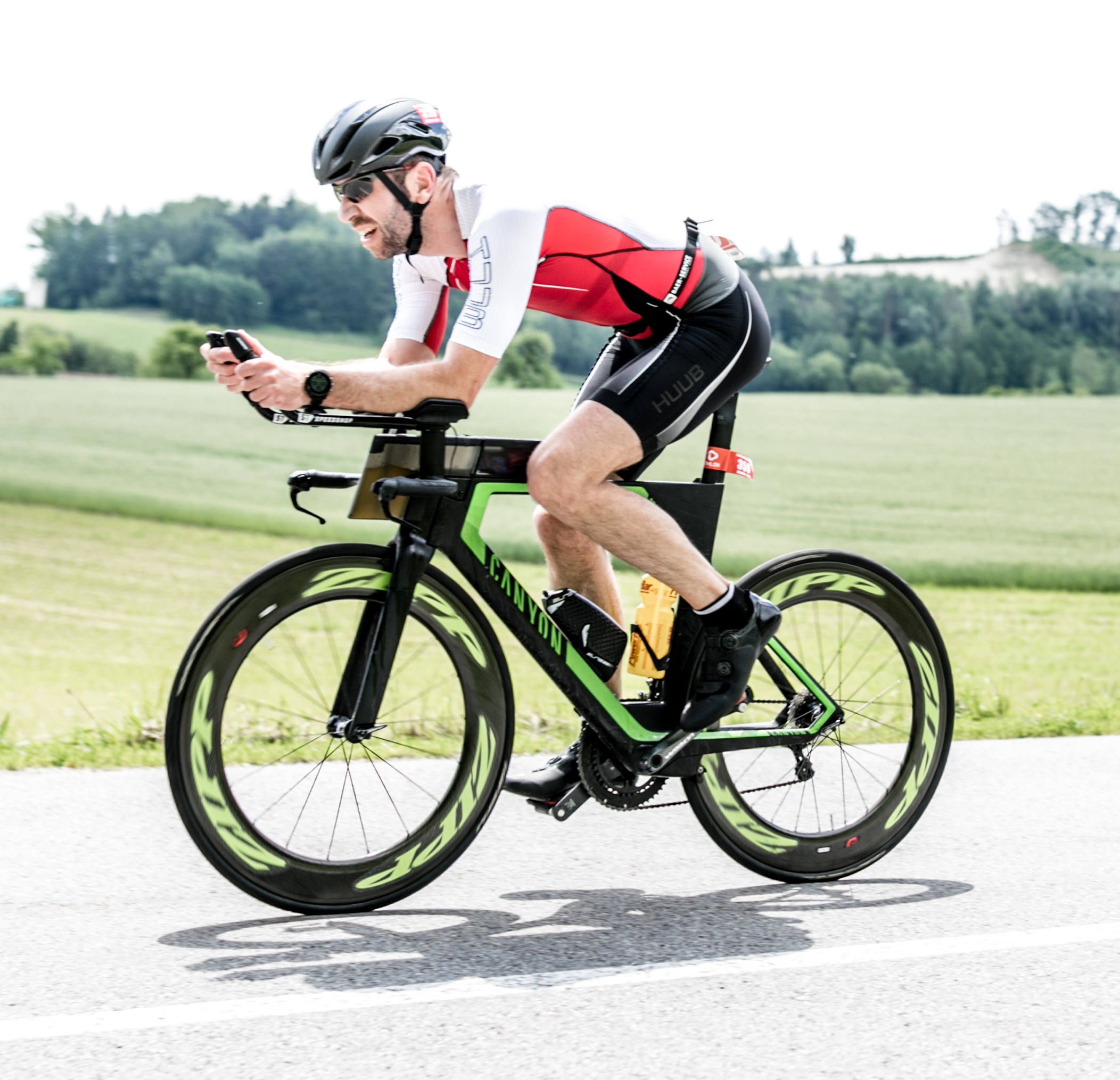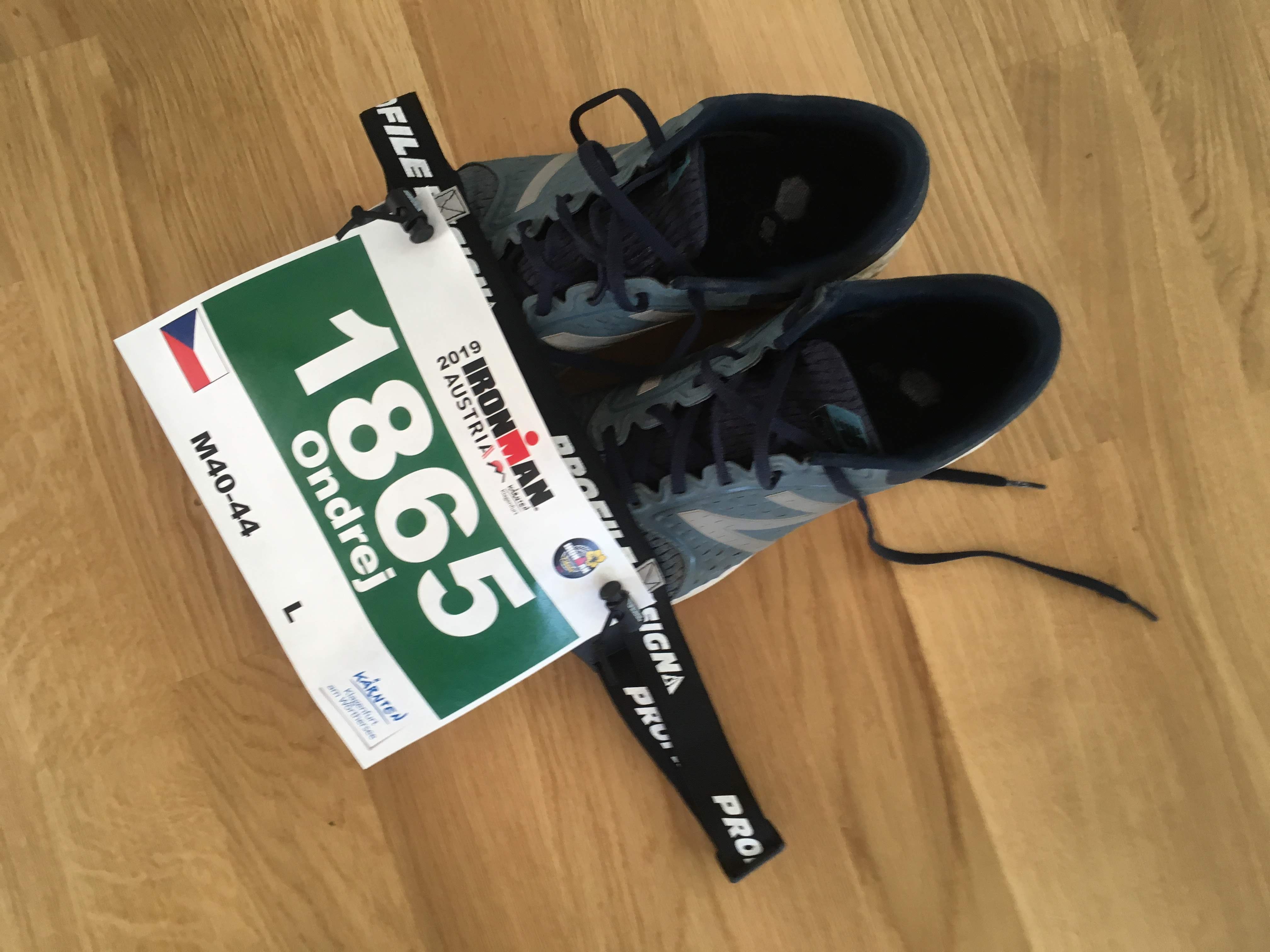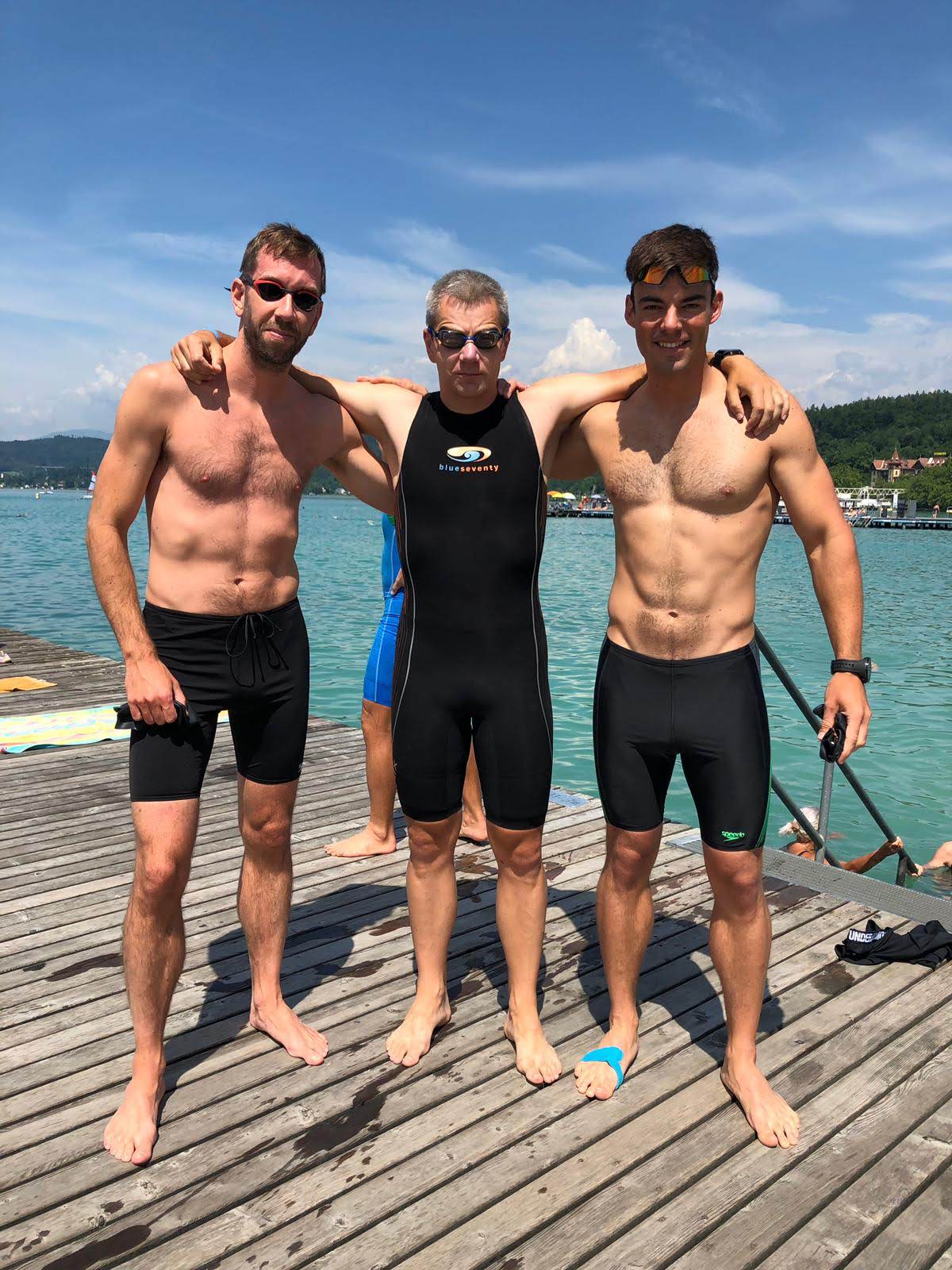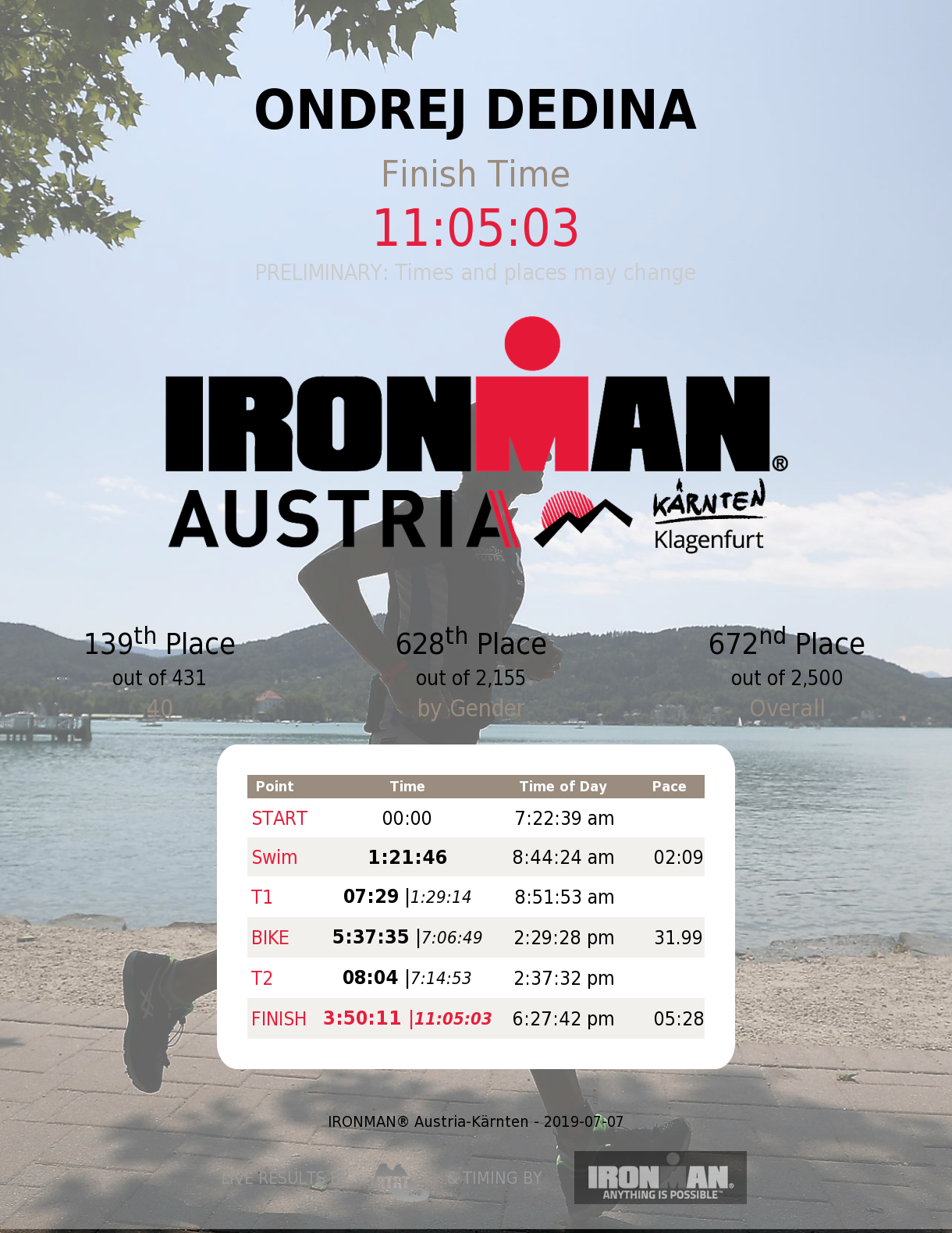Author

Vladimír Vaněček
Even impossible things are possible. If you gradually build them up from daily hard work.
Ironman is a concept not only for triathletes. The long triathlon race, held in various places around the world under the auspices of the World Triathlon Corporation, starts with a swim over a 3.86 km course, continues with a bike ride (180.25 km) and ends with a marathon run (42.2 km). All this has to be done in a maximum of 17 hours. MIBCON CEO Ondra Dědina did it in 11 hours, 5 minutes and 3 seconds in Klagenfurt, Austria, in the pre-race time. We bring you an interview with him from that time.

Ondra, how did you even think of participating in Ironman?
I do triathlon, I like the combination of sports. It’s not one-sided. For a long time, Ironman was something I didn’t believe was possible. But one of the most famous slogans of Ironman is “anything is possible”. I started thinking about it three years ago and trained intensively for two years.
And how did you know you were ready?
I knew it from the coach and from my feelings. Everything a person trains is recorded: watts, pulses, distances, speeds. You have exact daily schedules, what to do and why, we communicate with the trainer via the application, from which he can see how my training went.
How much time do the trainings take?
The ideal according to the trainer is nine training sessions per week within my time possibilities. Three swims, three laps, three runs. So two-phase training twice a week. The bike and sometimes the run are longer than an hour, together that’s ten to thirteen hours a week. Honestly, in relation to family and work, this is not always possible, realistically, I exercise on seven training sessions, i.e. nine to ten hours a week. And of course there is time for changing clothes, showering, going to the pool…
Is it ever too much for you?
You get used to it. Then when you don’t train, you feel that something is missing that day. But I’m not breaking my back over it, that’s what I agreed with the coach. Don’t go for blood. If I’m tired, it doesn’t fit into the family schedule or I don’t get enough sleep, I skip training. Preparation is not only about training, it is three pillars – training, diet, regeneration. You have to watch your food, and your sleep.
You have a tiny child, doesn’t your wife ever complain?
Sometimes definitely, but we try to set it up sensibly, my wife supports me. And I try to put it together so that it doesn’t affect the family too much. Like, for example, today Oli already went to the cottage with our daughter, and I’m going there by bike tomorrow.

And work?
Everyone has a different work-life balance, someone strictly separates time on vacation and at work, I read e-mails on vacation and work a little, but at the same time, as I say, I blend my personal life into my work life. I can easily go for a run during the day or ride my bike from work. It is true that I perceive family, triathlon and work together as a very full program.
Didn’t it rob you of your sense of freedom?
Not really. It gave me new experiences and friends. It really strengthens me mentally. I see that things can be changed. And then I also use it at work. It is not only about increasing physical endurance, but also about discipline and organization. Every training session counts, even if it may not be until a year from now. If I were to get rid of it one day, not much would happen again, but only apparently. It’s one drop, but if I missed one, I might miss another. But if you add it up gradually, you’ll put all those years to good use.
You use them at the race. How does one actually get to the Ironman?
If I don’t count Hawaii, which is a championship that is very difficult to get to, then you can simply apply. However, some races are very popular. For example, the one in Klagenfurt is usually advertised the very next day after the end of the previous one, and is completely sold out within a few hours. So you apply a year ahead.
And then you train for another year, and then you go there…
…the day before, I also went there with my family, we had an apartment near the lake. You have to collect numbers, store things in the depot where you have transitions between individual disciplines. It starts at 7 in the morning, so there is no time to put the stuff there on the race day.

It starts with a 3.86 km swim. How does one feel at the start?
The start is very emotional – you prepare for three years… But then you jump in and swim.
Does it start on mass?
It used to be like that and three thousand people jumped into the water en masse, it must have been more boxing than swimming, now they let four people in there every five seconds. This is how it starts for over an hour. The strongest swimmers go first.
Wasn’t the water too cold?
On the contrary, too warm. They banned wetsuits. This is a fundamental problem for swimming, swimming is much better in a wetsuit. Everyone prayed they wouldn’t ban wetsuits, and they finally did. Halfway through the swim I thought to myself that they did a good job because my temperature was just right. The swim was pretty uneventful, I finished better than I thought.
And how did the feelings develop on the bike?
The bike went very well for me, it was one big circuit of 180 km, 1500 meters of elevation gain. But there were two turning points for me. One in a hundred and fifty when I started feeling tired and thought I should slow down a bit. Typically in a triathlon, you have to remember that the race doesn’t end around you, that you still have a run to go. And the second moment, the most dramatic, was the end of the bike, about 20 km downhill to Klagenfurt, and there was such a storm that it almost knocked us off the road. People dismounted there, you couldn’t see, we were totally frozen, soaked. You are riding a triathlon special that has carbon wheels, it doesn’t slow down much, there is 5 cm of water on the road.
Worst part of the race?
Clearly. I thought if I could survive this I would be fine. In addition, I definitely left some time there, because it could be burned at 50, I hardly went 35 there. On the one hand, I like the bike the most out of the disciplines, but at the same time I feel a little nervous there, due to the dependence on the technique. You can get a puncture, something breaks, someone can knock you down. My coach didn’t even finish the race because of the bike, some guy knocked him off.
Wasn’t it time to rest a little in the depot after the round? To eat?
Definitely not to rest. You would then have to catch up every minute of rest, and that hurts. And eat, you eat all the time. Triathlon is not three disciplines, but five. Three classic, the fourth is a depot, you have to be really fast in the depot. The fifth is food. You have to learn to eat, you really have to eat those eleven hours. Because you have a huge energy output. So, on the bike and in the run, you have to stuff yourself with something.

How much do you look at other people’s performances?
Never. You go against yourself, you try to have the best time. You don’t look at those around you. In addition, if someone is running next to you, because of the rolling start, you don’t know when they actually started, you have no comparison.
And how do you take care of yourself?
You measure watts and pulses. And of course you go by feel. You know yourself.
Do you rely on the organizers for food?
Sure, you have an exact breakdown of what’s on the refreshments ahead of time. I take something of my own just for the start of the bike. Then every twenty kilometers you package food and drink and stuff it into yourself. On the run, there is a refreshment station every two, two and a half kilometers. It’s always good to grab something, as soon as you find yourself hungry or thirsty, you have a problem, a loss of energy that you can never recover from, you’re screwed. Feelings of hunger and thirst must be avoided.
So you have everything well planned in advance. Is there anything you would have done differently in retrospect?
At the start, I placed myself too far back – or rather, I estimated my swimming time well, but many believed in themselves more than they should have, and I was then hanging around among them. And I’m good on the bike, so mainly at the beginning I was just overtaking, which is not ideal. You have to be careful not to ride in the hook, so that they don’t disqualify you. But when you overtake, there is always someone in front of you, you have to keep your distance. So experience: start earlier.
I’m probably also satisfied with the run, the whole race went well for you.
I wanted to fit in 12 hours overall. And I finally managed it in 11. I didn’t even expect that. You know what values you’ve been trained in, but you never try out beforehand what it will do to you when you put it together. Running a marathon after you’ve been doing something for 7 hours before is a big difference from just running a marathon.
What does it feel like to reach the finish line?
The goal is a big show, a big stage, crowds around, your family is waiting for you there. It has atmosphere. They will report your name there that you are an Ironman. But I have to say that the start was slowly more emotional for me, when you realize that the race for which you have been training for a long time is actually happening. But the goal is also great.
And when will the greatest satisfaction come?
Probably the night after.
What advice would you give to those who want to try Ironman?
Prepare that it is about long-term and patience. There is no short way to the finish line in any of those disciplines, except perhaps the depot. Some people are looking for the ideal trainer, the ideal conditions, the ideal bike, but it cannot be shortened. In any case, I recommend a coach, you don’t know a lot of things, you get into a team, you meet other people, you’re not alone. For example, I know that without Radek (note: Radek Holinka, www.betri.cz) I would never have gotten to Klagen.
You have already successfully completed Ironman. Now what next, what about “life”?
But I didn’t have it in such a way that I would cross it off. I will continue to do triathlon, I enjoy it, it fulfills me. There is also a family that I owe some time to. This year I still have some races, “halves”, in the fall I would like to run a marathon, and then we’ll see. I will probably sign up for an Ironman again next year. I want to experience it a few more times. And maybe I’ll come across something else that will look “impossible” at first glance, who knows.

Vladimír Vaněček
Let us know what we can help you with and when it would be convenient to discuss the topic. We'll be happy to get back to you.